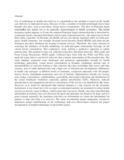| dc.description.abstract | Use of technology in health care delivery is considered as one solution to speed up the health care delivery in underserved areas. Because of this, a number of health technologies have been brought into play, such as providing virtual doctor consultations. The idea of Principal-Agent relationship has turned out to be generally acknowledged in health economics. The health insurance market appears to fit into the standard Principal-Agent relationship that is described by a principal (poorly educated individual) and an agent (educated person), who endeavour to boost their utility capacities. In Rwanda, the health services are openly regulated while yet third part, payer, health insurance, for example, Rwanda Social Security Board (RSSB) and other private insurance providers dominate the buying of human services. Therefore, this study focused on assessing the influence of health technology on principal-agent relationship focusing on the virtual doctor consultation. This exploratory study utilised a qualitative approach to gather primary data. The qualitative data was collected using Key Informant Interview (KII) guide and Focus Group Discussions (FGD) guide. Collected data from both the FGDs and KIIs were analysed using Atlas.ti version 8.4 software after a proper transcription of the recorded data. The study findings suggested some challenges and numerous opportunities brought by health technology particularly virtual doctor consultations in Rwanda. Challenges include lack of interoperability of software leading to data concerns like data ownership, data access and data security, lack of stable infrastructure and a high cost of infrastructure development, differences in health care packages at different levels of treatment, scepticism especially with old people, literacy levels, smartphone penetration and cost of internet. Opportunities include cost saving, time saving, convenience, confidentiality, accessibility and proper utilization and distribution of the scarce healthcare workforce especially general practitioners (GPs). Moreover, induced demand due to encouragement and due to convenience of the service was identified by the study. However, as it would be anticipated that induced demand is a big concern for the insurance institutions, it was found not to be as major as anticipated patients are prompted to utilize health services at an early stage of illness, which makes the cost lower. Finally, the study identified that information asymmetry that exist between the agent and principal was found to be huge and of a great concern especially the regulators who have no information on where the information for patients is kept and what it is used for. The study recommends proper integration, incentives alignment, proper identification of the technology and cost effectiveness analysis for proper incorporation of health technologies in the health system. | en_US |

